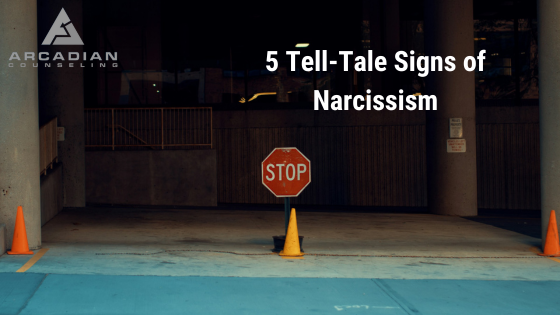We’ve pretty much all met someone who seems completely obsessed with themself at some point in our life. You know the type; they always turn conversations back to their own achievements. They dismiss others’ feelings. They believe they’re more special than everyone else. Since these are some of the more obvious signs of narcissism, maybe you’ve even wondered, Are they a narcissist? Recognizing the signs of narcissism is crucial for understanding these behaviors.
While true Narcissistic Personality Disorder (NPD) is a clinical diagnosis that only mental health professionals can make (and is much more rare than you might imagine) there are some clear signs of narcissistic behavior that you can spot in everyday interactions. Whether it’s a romantic partner, a boss, a family member, or a friend, here are five obvious signs that you might be dealing with a narcissist.
1. Everything Is Always About Them

One of the most blatant signs of narcissism is an excessive need for attention. Narcissists dominate conversations, shift focus back to themselves, and often appear uninterested in what others have to say – unless, of course, it somehow relates to them.
🔹 Examples of this behavior:
- You’re sharing something personal, and they interrupt with, “That’s nothing! You should hear what happened to me.”
- They constantly brag about their accomplishments, skills, or intelligence.
- When you talk about your own successes, they either downplay them or make it about themselves.
Narcissists crave admiration, so they will make sure they’re always the center of attention. So if someone you know consistently hijacks conversations or only engages when they can talk about themselves, then that’s a major red flag.
2. They Lack Empathy
Empathy, which is the the ability to understand and share someone else’s feelings, is something narcissists struggle with. They might be able to fake concern if it benefits them, but in reality, they have little genuine interest in how others feel.
🔹 Examples of this behavior might look like:
- If you’re upset, they dismiss your feelings or tell you to “get over it.”
- They show little to no guilt when they hurt someone.
- They struggle to acknowledge how their actions impact others.
A narcissist’s world revolves around themselves, so they often minimize or ignore the emotions of those around them. If you feel unheard, unseen, or emotionally dismissed, you may be dealing with a narcissist.
3. They Manipulate and Gaslight

Narcissists are master manipulators. They twist situations to suit their narrative and often engage in gaslighting – a psychological tactic that makes you doubt your own reality.
🔹 Examples of this behavior might look like
- They lie, then insist you’re imagining things when you call them out.
- They rewrite history, saying things like, “I never said that,” or, “You’re being too sensitive.”
- They make you question your own memory or feelings.
Gaslighting is dangerous because it slowly erodes your confidence in your own judgment. If someone constantly makes you doubt yourself, be cautious – you might be dealing with a narcissist.
4. They Have a Strong Sense of Entitlement
Narcissists believe they deserve special treatment and get frustrated when things don’t go their way. They expect others to cater to their needs without question and often disregard rules that apply to everyone else.
🔹 Examples of this behavior might look like:
- They demand VIP treatment, even when they haven’t earned it.
- They get angry if they don’t get what they want immediately.
- They act as if the world (and everyone in it) owes them something.
This sense of entitlement makes them difficult to deal with, especially in relationships where mutual respect and compromise are key. If someone constantly expects special treatment but never reciprocates, it’s a major warning.
5. They Struggle to Take Responsibility

Ever met someone who never admits they’re wrong? Narcissists avoid accountability like the plague. If something goes wrong, they will blame everyone and everything – except themselves.
🔹 Examples of this behavior might look like:
- If they fail at something, they blame their boss, the weather, or “jealous people” who tried to sabotage them.
- If they hurt you, they twist it around to make you feel guilty.
- They play the victim, even when they are clearly in the wrong.
Taking responsibility requires self-awareness, and narcissists would rather protect their ego than admit fault. If you notice someone constantly shifting blame and never apologizing sincerely, there’s a strong possibility they’re a narcissist.
A Note From Arcadian
While everyone can have selfish moments, chronic narcissistic behavior is toxic and can be deeply destructive – especially in close relationships. If you recognize these signs of narcissism in someone, it’s important to protect your own emotional well-being.
💡 What can you do?
- Set boundaries. Narcissists will take as much as you allow. Be firm in protecting your time and energy.
- Don’t expect them to change. True narcissists rarely take responsibility for their behavior.
- Seek support. Whether through friends, therapy, or support groups, having a strong support system can help you navigate these relationships.
Everyone deserves relationships that are healthy, balanced, and fulfilling. If you find yourself constantly drained by someone’s narcissistic behavior, don’t be afraid to step back and prioritize your own well-being.
James Killian, LPC is the Principal Therapist & Owner of Arcadian Counseling in Greater New Haven, CT where they specialize in helping over-thinkers, high achievers, and perfectionists reduce stress, increase fulfillment and enhance performance so they can move From Surviving To Thriving.

